#Social issues
Text

A.2.16 Does anarchism require “perfect” people to work?
No. Anarchy is not a utopia, a “perfect” society. It will be a human society, with all the problems, hopes, and fears associated with human beings. Anarchists do not think that human beings need to be “perfect” for anarchy to work. They only need to be free. Thus Christie and Meltzer:
”[A] common fallacy [is] that revolutionary socialism [i.e. anarchism] is an ‘idealisation’ of the workers and [so] the mere recital of their present faults is a refutation of the class struggle … it seems morally unreasonable that a free society … could exist without moral or ethical perfection. But so far as the overthrow of [existing] society is concerned, we may ignore the fact of people’s shortcomings and prejudices, so long as they do not become institutionalised. One may view without concern the fact … that the workers might achieve control of their places of work long before they had acquired the social graces of the ‘intellectual’ or shed all the prejudices of the present society from family discipline to xenophobia. What does it matter, so long as they can run industry without masters? Prejudices wither in freedom and only flourish while the social climate is favourable to them … What we say is … that once life can continue without imposed authority from above, and imposed authority cannot survive the withdrawal of labour from its service, the prejudices of authoritarianism will disappear. There is no cure for them other than the free process of education.” [The Floodgates of Anarchy, pp. 36–7]
Obviously, though, we think that a free society will produce people who are more in tune with both their own and others individuality and needs, thus reducing individual conflict. Remaining disputes would be solved by reasonable methods, for example, the use of juries, mutual third parties, or community and workplace assemblies (see section I.5.8 for a discussion of how could be done for anti-social activities as well as disputes).
Like the “anarchism-is-against-human-nature” argument (see section A.2.15), opponents of anarchism usually assume “perfect” people — people who are not corrupted by power when placed in positions of authority, people who are strangely unaffected by the distorting effects of hierarchy, privilege, and so forth. However, anarchists make no such claims about human perfection. We simply recognise that vesting power in the hands of one person or an elite is never a good idea, as people are not perfect.
It should be noted that the idea that anarchism requires a “new” (perfect) man or woman is often raised by the opponents of anarchism to discredit it (and, usually, to justify the retention of hierarchical authority, particularly capitalist relations of production). After all, people are not perfect and are unlikely ever to be. As such, they pounce on every example of a government falling and the resulting chaos to dismiss anarchism as unrealistic. The media loves to proclaim a country to be falling into “anarchy” whenever there is a disruption in “law and order” and looting takes place.
Anarchists are not impressed by this argument. A moment’s reflection shows why, for the detractors make the basic mistake of assuming an anarchist society without anarchists! (A variation of such claims is raised by the right-wing “anarcho”-capitalists to discredit real anarchism. However, their “objection” discredits their own claim to be anarchists for they implicitly assume an anarchist society without anarchists!). Needless to say, an “anarchy” made up of people who still saw the need for authority, property and statism would soon become authoritarian (i.e. non-anarchist) again. This is because even if the government disappeared tomorrow, the same system would soon grow up again, because “the strength of the government rests not with itself, but with the people. A great tyrant may be a fool, and not a superman. His strength lies not in himself, but in the superstition of the people who think that it is right to obey him. So long as that superstition exists it is useless for some liberator to cut off the head of tyranny; the people will create another, for they have grown accustomed to rely on something outside themselves.” [George Barrett, Objections to Anarchism, p. 355]
Hence Alexander Berkman:
“Our social institutions are founded on certain ideas; as long as the latter are generally believed, the institutions built on them are safe. Government remains strong because people think political authority and legal compulsion necessary. Capitalism will continue as long as such an economic system is considered adequate and just. The weakening of the ideas which support the evil and oppressive present day conditions means the ultimate breakdown of government and capitalism.” [What is Anarchism?, p. xii]
In other words, anarchy needs anarchists in order to be created and survive. But these anarchists need not be perfect, just people who have freed themselves, by their own efforts, of the superstition that command-and-obedience relations and capitalist property rights are necessary. The implicit assumption in the idea that anarchy needs “perfect” people is that freedom will be given, not taken; hence the obvious conclusion follows that an anarchy requiring “perfect” people will fail. But this argument ignores the need for self-activity and self-liberation in order to create a free society. For anarchists, “history is nothing but a struggle between the rulers and the ruled, the oppressors and the oppressed.” [Peter Kropotkin, Act for Yourselves, p. 85] Ideas change through struggle and, consequently, in the struggle against oppression and exploitation, we not only change the world, we change ourselves at the same time. So it is the struggle for freedom which creates people capable of taking the responsibility for their own lives, communities and planet. People capable of living as equals in a free society, so making anarchy possible.
As such, the chaos which often results when a government disappears is not anarchy nor, in fact, a case against anarchism. It simple means that the necessary preconditions for creating an anarchist society do not exist. Anarchy would be the product of collective struggle at the heart of society, not the product of external shocks. Nor, we should note, do anarchists think that such a society will appear “overnight.” Rather, we see the creation of an anarchist system as a process, not an event. The ins-and-outs of how it would function will evolve over time in the light of experience and objective circumstances, not appear in a perfect form immediately (see section H.2.5 for a discussion of Marxist claims otherwise).
Therefore, anarchists do not conclude that “perfect” people are necessary anarchism to work because the anarchist is “no liberator with a divine mission to free humanity, but he is a part of that humanity struggling onwards towards liberty.” As such, ”[i]f, then, by some external means an Anarchist Revolution could be, so to speak, supplied ready-made and thrust upon the people, it is true that they would reject it and rebuild the old society. If, on the other hand, the people develop their ideas of freedom, and they themselves get rid of the last stronghold of tyranny — the government — then indeed the revolution will be permanently accomplished.” [George Barrett, Op. Cit., p. 355]
This is not to suggest that an anarchist society must wait until everyone is an anarchist. Far from it. It is highly unlikely, for example, that the rich and powerful will suddenly see the errors of their ways and voluntarily renounce their privileges. Faced with a large and growing anarchist movement, the ruling elite has always used repression to defend its position in society. The use of fascism in Spain (see section A.5.6) and Italy (see section A.5.5) show the depths the capitalist class can sink to. Anarchism will be created in the face of opposition by the ruling minorities and, consequently, will need to defend itself against attempts to recreate authority (see section H.2.1 for a refutation of Marxist claims anarchists reject the need to defend an anarchist society against counter-revolution).
Instead anarchists argue that we should focus our activity on convincing those subject to oppression and exploitation that they have the power to resist both and, ultimately, can end both by destroying the social institutions that cause them. As Malatesta argued, “we need the support of the masses to build a force of sufficient strength to achieve our specific task of radical change in the social organism by the direct action of the masses, we must get closer to them, accept them as they are, and from within their ranks seek to ‘push’ them forward as much as possible.” [Errico Malatesta: His Life and Ideas, pp. 155–6] This would create the conditions that make possible a rapid evolution towards anarchism as what was initially accepted by a minority “but increasingly finding popular expression, will make its way among the mass of the people” and “the minority will become the People, the great mass, and that mass rising up against property and the State, will march forward towards anarchist communism.” [Kropotkin, Words of a Rebel, p. 75] Hence the importance anarchists attach to spreading our ideas and arguing the case for anarchism. This creates conscious anarchists from those questioning the injustices of capitalism and the state.
This process is helped by the nature of hierarchical society and the resistance it naturally developed in those subject to it. Anarchist ideas develop spontaneously through struggle. As we discuss in section I.2.3, anarchistic organisations are often created as part of the resistance against oppression and exploitation which marks every hierarchical system and can., potentially, be the framework of a few society. As such, the creation of libertarian institutions is, therefore, always a possibility in any situation. A peoples’ experiences may push them towards anarchist conclusions, namely the awareness that the state exists to protect the wealthy and powerful few and to disempower the many. That while it is needed to maintain class and hierarchical society, it is not needed to organise society nor can it do so in a just and fair way for all. This is possible. However, without a conscious anarchist presence any libertarian tendencies are likely to be used, abused and finally destroyed by parties or religious groups seeking political power over the masses (the Russian Revolution is the most famous example of this process). It is for that reason anarchists organise to influence the struggle and spread our ideas (see section J.3 for details). For it is the case that only when anarchist ideas “acquire a predominating influence” and are “accepted by a sufficiently large section of the population” will we “have achieved anarchy, or taken a step towards anarchy.” For anarchy “cannot be imposed against the wishes of the people.” [Malatesta, Op. Cit., p. 159 and p. 163]
So, to conclude, the creation of an anarchist society is not dependent on people being perfect but it is dependent on a large majority being anarchists and wanting to reorganise society in a libertarian manner. This will not eliminate conflict between individuals nor create a fully formed anarchist humanity overnight but it will lay the ground for the gradual elimination of whatever prejudices and anti-social behaviour that remain after the struggle to change society has revolutionised those doing it.
#faq#anarchy faq#revolution#anarchism#daily posts#communism#anti capitalist#anti capitalism#late stage capitalism#organization#grassroots#grass roots#anarchists#libraries#leftism#social issues#economy#economics#climate change#climate crisis#climate#ecology#anarchy works#environmentalism#environment#solarpunk#anti colonialism#mutual aid#cops#police
27 notes
·
View notes
Text
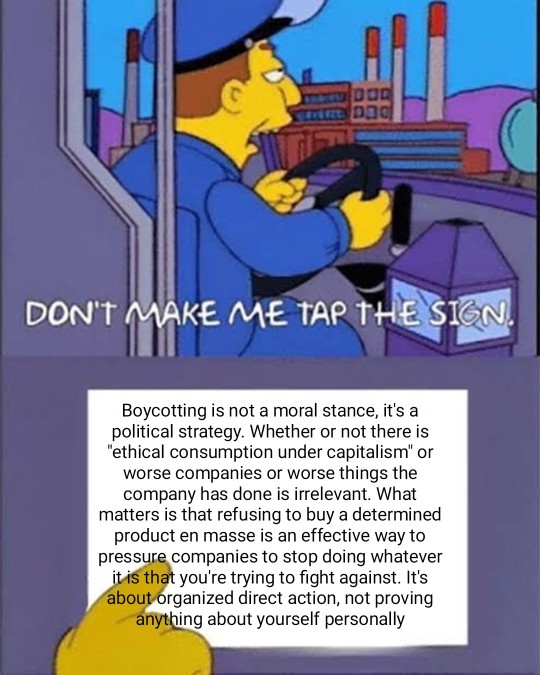
Please stop seeing politics as an identity and start seeing it as a collective means for change
#i am so tired of ppl trying to use 'theres no ethical consumption under capitalism' in regards to BDS#it's not about ethics it's about participating in a political strategy palestinians have spent YEARS promoting as a means for change#some things are in fact not about you#social justice#I/P#social issues#palestine#gaza#free palestine#free gaza#id in alt#overflowing trashcan
71K notes
·
View notes
Text

I just wanted to share this article about Palestine's right to revolt and why it is important that we support it. It also has sources embedded in the text that debunk misinformation about them and Hamas. I implore everyone to read it and spread this information around.
Edit [12/25/23 3:19 PM GMT+]: I should also emphasize that the article is an opinion piece, so I also encourage you to also do further research to come to your own critical conclusions.
As a whole, the article still explores why Palestinians resist. As someone whose entire history was build on resisting against oppressors (I'm Filipino), I can understand and empathize where they are coming from. This is one way that I wish to express my solidarity.
68K notes
·
View notes
Text
I’m just here to remind everyone once again that we can’t stop protesting and boycotting and spreading the word for Palestine, even if it’s been a while. The people in power (mainly the Israeli and US governments) are relying on us losing steam.
And I do want to mention that a small bit of hope to be found among all of this is that things aren’t losing steam. I still see dozens of posts about Palestine every day, I see footage of protests almost every day, and the boycotts are working. I just want to encourage everyone that we just need to keep it up! I’ve seen so many social issues fade out over time, a week of outrage and then things settle down, but that isn’t the case here and I really respect everyone who’s still posting and protesting and seeking out information to end this once and for all. Focus on that hope, and use it to keep going :)
#palestine#pro palestine#free palestine#israel#anti israel#us politics#world politics#social issues#protest#boycott#from the river to the sea palestine will be free
21K notes
·
View notes
Text
Transphobes aren't attacking bathrooms randomly. It's not about protecting women and children, it's about preventing trans people from participating in public life.
Access to toilet facilities are essential to being able to participate in public life.
It's why society was so reluctant to introduce public bathrooms for women, because before that all public bathrooms were for men only.
It's why society was so reluctant to desegregate toilets for Black people.
It's why society was and is so reluctant to create disability-accessible bathroom stalls.
If a person can't access a toilet, then it's extremely difficult to impossible for them to participate in society.
So, the best way to exclude a group of people from society without putting up a literal sign saying "x group of people not allowed" is to prevent them from accessing the bathroom.
10K notes
·
View notes
Text
neurotypicals will SWEAR they support you but the second you unmask they stare at you weirdly and question why you’re acting differently
thanks for supporting me! i feel so seen right now!! let me just put this back on…
#neurodivergent#autism#autistic experiences#autistic things#being autistic#adhd problems#neurodiverse stuff#neurodiversity#masking#social issues
6K notes
·
View notes
Text
If you see a post that says that Israel is getting away with genocide because it's Jewish, or because Jews are given some sort of special privilege in society due to the holocaust, or because of the position of "privilege" the west gives to Jews, or because our society is "too sensitive" to antisemitism: RUN! Those takes are not coming from a good place.
Zionism is supported by the west despite it being Jewish, not because of it. It's supported due to propping up foreign interests in the region and justifies American imperialism in West Asia. For some it's supported due to the desire to bring about Christian apocalypse.
If someone treats Zionism as being propped up because of some sort of Jewish power in the west they are promoting antisemitism, weather knowingly or unknowingly.
#196#my thougts#jumblr#jewish#jewblr#antisemitism#antisemites#dog whistle#free palestine#leftism#leftist#social issues#social justice#social media
5K notes
·
View notes
Text
Your daily reminder to not put "You SHOULD be reblogging this" in your posts because you're going to trigger somebody's OCD. Especially when it comes to topics such as social justice or politics. Yes, your message is important but guilting people into reblogging it is not just reblog bait, but it can harm somebody mentally.
6K notes
·
View notes
Text
Stop using Adobe's programs
So far @adobe has been proving that they don't care about artist or creatives. Especially since they have started to use AI generators in not just their programs but marketing too.

Also their so called opt out option for their AI generator, hasn't been working. Artist have been coming out with proof that their work was still being used. Even though they opt out and on top of that all Adobe did to fix this was pay the artist. One artist was only paid around 300$, for their entire portfolio and remember this work will be re used as long as this program is still going. So to me that's a pretty unfair payment, especially since they opt out.
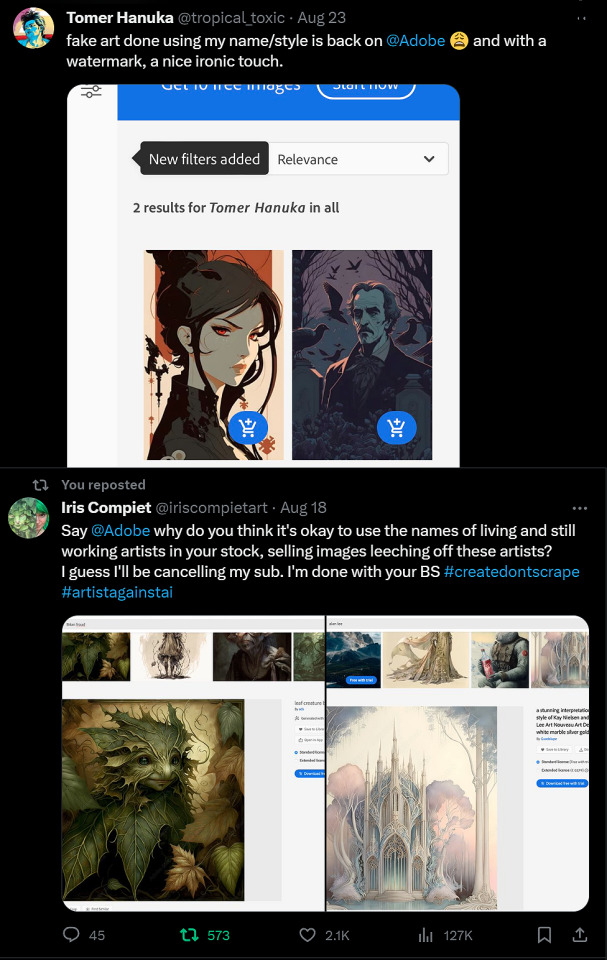
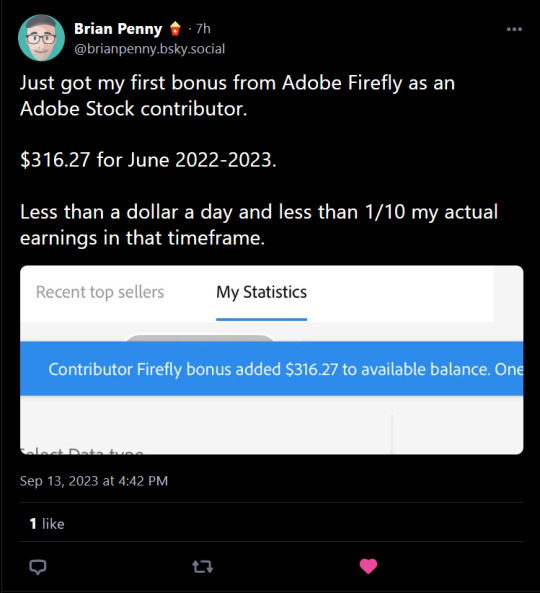
As far as I know of only one artist who had this issue got their work "supposably" removed from their AI generator. On top of that it was a popular artist (Loish). So it seems if they did do this. It was because the artist had a big following.
For those who do want to leave adobe here is a list of options. All programs that can replace any of Adobes.

Also a great artist made a good video about this subject. I fully recommend watching it if your interested.
youtube
#art#artist#ai#adobe photoshop#adobe#program#photography#social issues#issues#fuck ai#anti ai#adobe firefly#Youtube
3K notes
·
View notes
Text
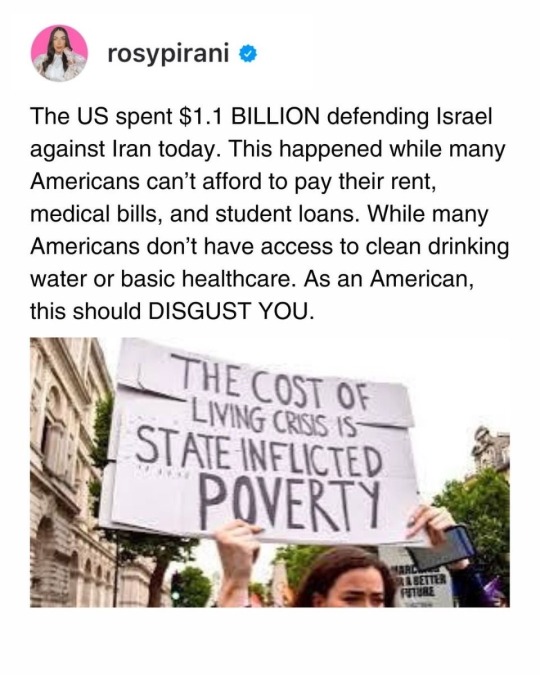
#communist#communism#socialist#socialist revolution#social issues#social justice#socialism#anarchocommunism#anarchism#anarchist#anarchopunk#punk#gaza#free gaza#gaza strip#gaza genocide#save gaza#gazaunderattack#war on gaza#news on gaza#stand with gaza#gazaunderfire#israel#israhell#iran
746 notes
·
View notes
Text
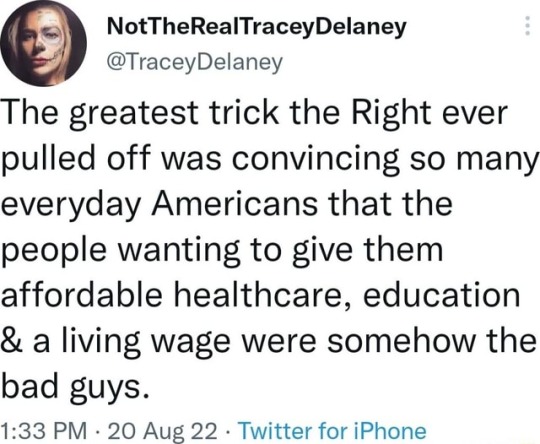
#free healthcare#free education#anti capitalism#eat the rich#late stage capitalism#capitalism#fuck capitalism#socialism#antiwork#capitalist hell#poverty#social issues#society#social security#social commentary#social justice#social skills#regulation#investments#social distancing
3K notes
·
View notes
Text


On May Day 2017, anarchists participated in lively demonstrations all around the United States, from the heartland to the coasts. In the Northwest, Seattle witnessed a successful block party at the site of a juvenile corrections center, while in Olympia anarchists barricaded train tracks to oppose fracking and clashed with police. Support arrestees here. Yet Portland, Oregon may take the cake for the most creative and combative May Day. Demonstrators not only defended themselves from unprovoked attacks from police who declared the march a riot—they also introduced exciting new innovations into the aesthetic of the black bloc street presence. Here, comrades from Portland explain their goals with the giant spiders they created for May Day, and offer a helpful guide for those who wish to make spiders of their own.
In an effort to bridge the gap between art and activism, giant spiders were assembled off-site and pushed up the street to the demonstration, stocked with water bottles, snacks, earplugs, and other party favors. The idea was to narrow the divide between “us” and “them” that often exists at demonstrations, and it was a complete success. We performed community outreach, engaged in cultural development, boosted morale, provided crucial supplies, and created an amazing photo opportunity in the process.
The concept is multi-dimensional: it works on many different levels. The idea began from frustrations around attendance at local demonstrations. In Portland, where the majority of citizens seem to be white, middle-class, and apolitical on account of these privileges, they don’t show up unless a demonstration concerns their interests specifically. However, Portlanders are fascinated by their own love of art and “wacky” stuff as well as the commodification of protest as “funtertainment.” We decided to embrace this love of the “weird” to test whether a hyper-localized approach to engaging people could succeed.
Our tactical art enabled us to fill a supporting role for other participants in the march, helping challenge narratives that the black bloc is an “othered” or “othering” tactic. Whether this separation is intentional or not, the fact remains that the general public is often hesitant to engage with us. Bearing that in mind—as well the tendency of the Portland Police Department to brutally shut down demonstrations—we stocked our Spiders with fliers, water, LAW (liquid, antacid, water, the eyewash with which street medics treat pepper spray), ear plugs, and snacks. We also included a few other party favors, because anarchy needs revelry!
We intentionally engaged with the folks around us. A lot of people walked up to ask what the spiders meant! It was inspiring to see so much dialogue between folks in everyday garb and folks in black bloc. We explained the ideas behind our actions as anarchists and the creations themselves: the three spiders representing Mutual Aid, Solidarity, and Direct Action.
A word about symbolism. The idea of using the spider as an icon of resistance is that spiders are always there watching, waiting, and keeping the environment free of pesky insects and other parasites that consume resources without supporting their fellow beings. While we may look scary, we’re here with you and for you. We are the spiders, and the insects are the societal ills that we fight against.
The symbolism of the black widow spider is rich with history that guides our work. We want to contribute to that rich history, adding our own interpretations. Mutual Aid, Solidarity, Direct Action are our black widow’s cruses. (Crux? Curse? Cures?)
In regards to developing our own culture, there are many barriers we face in this process. State repression is the biggest threat, of course. The specter of state repression can complicate organizing, planning, and building trust in our communities. Portland has a history of repression and slander, ruining the lives of activists and anarchists; these horror stories reverberate throughout the underground. We can’t allow ourselves to be publicly disparaged and forced into hiding by our adversaries and their culture war, so we create as a political act. Creating is intuitively human: we plan, we build, we think, we conspire, we imagine. It is also an activity in which everyone can engage to some degree while building new skills. It enables us to get to know each other, build trust, and share time and company.
More globally, seizing the Spectacle is a step towards our goals, because it allows us to dictate our own narratives. With the development of Public Relations and Social Engineering, the visage of capitalism has come to define its delusional reality. To paraphrase Guy Debord, lived experiences are now taken in as a collection of representational images. We can tell our own stories and show the general public what these three principles mean in action. We can create our own mythos, speaking out on our own terms, in our own language, with our own symbols. The state and media dictate too much of what we’re allowed to say and how it’s spun—it’s time to spin our own webs to connect and fortify our relationships.
We are building the bridges we need to move forward. The existing connections between art, activism, and anarchism are fiery and well-storied. The new wave of repression under Trump’s regime is still building steam, but it is already proving dangerous. We need to be more careful than ever. Art allows us to demonstrate and show our fangs, and we can use art to empower those around us.
#how-to#guides#and manuals#May Day#Portland#protest#reportback#community building#practical anarchism#anarchist society#practical#mutual aid#grassroots#organization#anarchism#resistance#autonomy#revolution#anarchy#daily posts#communism#anti capitalist#anti capitalism#late stage capitalism#grass roots#anarchists#libraries#leftism#social issues#economics
25 notes
·
View notes
Text
So apparently some Swiss company found out that Brazilian blood has more immunoglobulin (which is used in some medications made by pharma companies) than European blood, and now international pharma companies are lobbying to change Brazilian law to allow them to use our blood as a resource
There is no current evidence that those things are related, but it just so happens that at the same time there is also another law being discussed that would get rid of "bureaucracy" when it comes to ethics analyses of trials on humans. It would also remove the right, which all brazilians currently have, to access to the medication resulting from the trials they participated in
Both sources are in Portuguese because both news have been recently broke by a Brazilian investigative news agency, but if you don't speak it, you can always use automatic translation
I know there's a lot of fucked up shit happening in the world right now, but please pay attention to medical rights in Brasil right now. Especially if you're European, because virtually every company related to this is from your continent and plans to benefit you above all
ETA: using blood as a resource for these medications is not new; however, current law in brasil only allows that use to come from donated blood (because it comes from the plasma and apparently not all of it is used in blood transfusion; I'm not a doctor so I'm not clear on the details but that's the gist of it) and to be processed and used by Hemobrás, the State-owned company that handles this type of medical technology. The new law would allow for private companies to buy our blood from blood banks for their use. It is worth noting that at least one company has already explicitly stated that they won't be making the resulting medication available in the Brazilian market, so, essentially, they will be taking blood Brazilians donated to help other Brazilians and using it to treat immunocompromised Europeans, to the detriment of immunocompromised Brazilians that need the medicine. In the process, they will be making it harder for our State-owned company to use that same blood, forcing us to import from them and therefore making the medication more expensive. They also want to make it possible for Brazilians to sell their own blood - a deeply ethically questionable practice that is discouraged by the WHO and that has led to HIV outbreaks in Brasil in the past
#i hate it here i hate it here i HATE IT HERE im sick of this shit#social justice#geopolitics#latin america#brasil#brazil#social issues#latine shit
20K notes
·
View notes
Text

BARBARA KRUGER / "UNTITLED" / 1980
[photograph | 37 × 50”]
#barbara kruger#conceptual#80s#contemporary art#graphic design#social issues#monochrome#american#art#u
410 notes
·
View notes
Text
The world is so hostile to tweens.....
Like we joke about how our schools growing up would ban the latest toy trends, but that reality genuinely horrific when you think about it. Like maybe 1% of the bans were based on safety, but the rest cited reasoning like
-"kids were bartering for collectibles" (kids learning about economics and product value)
-"kids were wearing them and the colors were too flashy" (kids experimenting with self expression and fashion)
-"kids were playing with them during lunch and recess instead of using our rusted safety hazard playground" (kids utilizing their free time to do what helps *them* unwind).
Play areas specifically geared towards children and especially towards teens are constantly being shut down. "Oh kids today are always on their phones!" Maybe because
-there are barely any arcades left and even less arcades that aren't adult-oriented,
-public pools and gyms are underfunded and shut down,
-"no loitering" laws prevent kids and teens from just hanging out,
-movie theatres only play the latest films and ticket prices are only rising,
-parks and playgrounds are either neglected or replaced with gear only directed at toddlers and unsuitable for anyone older
-genuine children's and young teen media is being phased out in favour of media directed only at very small children or older teens and adults.
-suburbs and even cities are becoming more and more hostile to pedestrians, it's just not safe for kids to walk to or ride their bikes to their friends' houses or other play destinations
Children's agency is hardly ever respected. Kids between the ages of 9-13 are either treated as babies or as full-grown adults, with no in-between. When they ask to be given more independence, they are either scoffed at or given more responsibilities than are reasonable for a child their age.
This is even evident in the fashion scene.
Clothing stores and brands like Justice and Gap are either closing or rebranding to either exclusively adult clothing or young children's clothes, with no middle ground for tweens. Tweens have to choose between clothes designed for adults that are too large and/or too mature for their age and bodies, or more clothes they feel are far too childish. For tween girls especially it's either a frilly pinafore dress with pigtails or a woman's size dress with cleavage. No wonder tween girls these days dress like they're older, it's because their other option is little girl clothes and they don't want to feel childish.
And then when tweens go to school, the books they want to read aren't available because they cover "mature" topics (read: oh no two people kissed and they weren't straight or oh no menstruation was mentioned or oh no a religion other than Christianity is depicted), so kids are left with books for way below their reading level. No wonder kids today are struggling with literacy, it's because they can't exercise and expand their reading skills with age-appropriate books. Readers need to be challenged with new words and concepts in order to grow in their skills, only letting tween read Dr. Seuss and nursery rhymes doesn't let them learn.
Discussions about substance use, reproduction, and sexuality aren't taught at an age-appropriate level in school or even by children's parents, so they either grow up ignorant and more vulnerable to abuse, or they seek out information elsewhere that is delivered in a less-than-age-appropriate manner. It shouldn't be a coin-toss between "I didn't know what sex was until I was 18 and in college" or "my first exposure to sex as a tween was through porn" or "I didn't know what sex was so I didn't know I was being sexually abused as a kid."
Tweenhood is already such a volatile and confusing time for kids, their bodies are changing and they're transitioning from elementary to middle to high school. It's hard enough for them in this stage, but it's made worse by how society devalues and fails them.
We talk about the disappearance of teenagehood, and maybe that's gonna happen in the future, but the erasure of tweenhood is happing in real time, and it's having and going to have major consequences for next generation's adults.
#leftie shit#i guess#ageism#social issues#tweenhood#the disappearance of tweenhood#current events#relevant issues
12K notes
·
View notes
Text
This makes me incredibly angry.

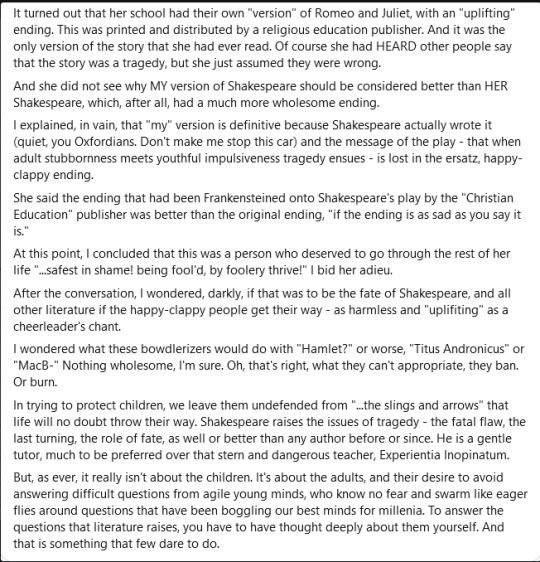
[ID: Screenshots of a Facebook post from user Advocatus Peregrini, which reads:
I was conversing with a fully-grown adult a few days ago, born and educated in the USA, who let this little gem drop:
"Well, it's like Shakespeare said, "Love conquers all!""
I pointed out that Shakespeare never said that, Virgil did, (Eclogues X) and Chaucer after him (Canterbury Tales.)
She said, "Oh I'm sure Shakespeare said that. In Romeo and Juliet!"
I sighed. I've been in that play several times, in different roles, and even directed it. That text does not occur in it.
But the real grind-my-teeth moment here was that if Romeo and Juliet can be said to have a message, it is most certainly not "Love conquers all," seeing as the lovers die by their own hands with a trail of their friends and relations' corpses in their wake.
Neither this fact, nor the fact that I knew the play, nor my explanation that Virgil and Chaucer used the phrase long before Shakespeare's birth dented her determination that "Love conquers all" came from Shakespeare.
"You don't know ALL the versions!" she protested.
All the versions?
Alternative Bard?
With every instinct screaming at me to let the matter drop, warning me that some horror that will not soon be absent from my nightmares waited around the next corner of this conversation. I pressed on.
It was a decision I was soon to regret.
I asked when she had first read "Romeo and Juliet." She said she had only read it once, when she was in Junior High. In the version she was taught, Romeo and Juliet survive, are reconciled with their parents, and are married in the church with their friends Mercutio and Tybalt arm in arm in the wedding party.
"Help me into some house, Benvolio, or I shall faint."
It turned out that her school had their own "version" of Romeo and Juliet, with an "uplifting" ending. This was printed and distributed by a religious education publisher. And it was the only version of the story that she had ever read. Of course she had HEARD other people say that the story was a tragedy, but she just assumed they were wrong.
And she did not see why MY version of Shakespeare should be considered better than HER Shakespeare, which, after all, had a much more wholesome ending.
I explained, in vain, that "my" version is definitive because Shakespeare actually wrote it (quiet, you Oxfordians. Don't make me stop this car) and the message of the play - that when adult stubbornness meets youthful impulsiveness tragedy ensues - is lost in the ersatz, happy-clappy ending.
She said the ending that had been Frankensteined onto Shakespeare's play by the "Christian Education" publisher was better than the original ending, "if the ending is as sad as you say it is."
At this point, I concluded that this was a person who deserved to go through the rest of her life "...safest in shame! being fool'd, by foolery thrive!" I bid her adieu.
After the conversation, I wondered, darkly, if that was to be the fate of Shakespeare, and all other literature if the happy-clappy people get their way - as harmless and "uplifiting" as a cheerleader's chant.
I wondered what these bowdlerizers would do with "Hamlet?" or worse, "Titus Andronicus" or "MacB-" Nothing wholesome, I'm sure. Oh, that's right, what they can't appropriate, they ban. Or burn.
In trying to protect children, we leave them undefended from "...the slings and arrows" that life will no doubt throw their way. Shakespeare raises the issues of tragedy - the fatal flaw, the last turning, the role of fate, as well or better than any author before or since. He is a gentle tutor, much to be preferred over that stern and dangerous teacher, Experientia Inopinatum.
But, as ever, it really isn't about the children. It's about the adults, and their desire to avoid answering difficult questions from agile young minds, who know no fear and swarm like eager flies around questions that have been boggling our best minds for millenia. To answer the questions that literature raises, you have to have thought deeply about them yourself. And that is something that few dare to do.] end id
3K notes
·
View notes